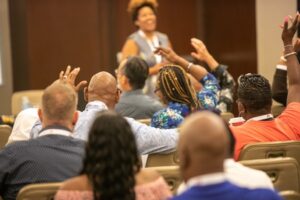NMAC is hosting a series of free summer virtual trainings, I hope you can join us.
- National Training for Transgender/Gender Non-Conforming PLHIV (July 6-9)
- National Training for PLHIV in Indian Country (Jul 12-14)
- National Training for PLHIV in the Latinx Community in Spanish (July 19-23)
- National Training for Gay Black Men living with HIV (Aug 2-6)
- National Training for Cisgender Heterosexuals living with HIV (Aug 9-13)
- National Training for PLHIV in the Latinx Community in English (Aug 16-20)
- Midwest Stigma Training (Aug 23-27)
- Southern Stigma Training (Aug 30-Sep 4)
- Southwest Stigma Training (Sep 13-17)
This summer NMAC will hold a mix of regional and national virtual trainings. Given feedback, some trainings will engage communities highly impacted by HIV like the transgender/gender non-conforming community, Indian Country, Latinx community (Spanish and English), Black Gay Men, and Heterosexuals, as well as regional trainings on stigma.
The Transgender/Gender Non-Conforming training (July 6-9) will be coordinated by Lauren Miller. Please email or phone (202-997-0951) with questions. The trainers for this session will be Aryah Lester, Tori Cooper and Ja’Mel Ware. The goal is to create a safe space for the transgender/gender non-conforming community to share, learn, and build community.
.
The Indian Country training (July 12-14) will be coordinated by Christopher J. Paisano. Please email or phone (202-997-0396) with questions. The goal is to create a safe space for American Indian/Alaska Natives living with HIV to share, learn, and build community.
There are two trainings targeting the Latinx community (July 19-23 in Spanish & August 16-20 in English). Cora Trelles Cartagena is the coordinator for these trainings. You can reach her via email or phone (202-870-0481). The goal is to create a safe space for the Latinx community to share, learn, and build community.
The Black Gay Men living with HIV training (August 2-6) will be coordinated by Charles Shazor Jr.. Please email or phone (202-302-7515) with questions. The goal is to create a safe space for Black Gay Men living with HIV to share, learn, and build community.
The training for Cisgender Heterosexuals living with HIV will be coordinated by Gabriella Spencer and Lauren Miller. Lauren’s information is above. You can email or phone (202-738-0935) Gabriella with any questions. The goal is to create a safe space for heterosexuals living with HIV to share, learn, and build community.
Additionally, NMAC will host three regional Stigma Reduction trainings (Aug 23-27, Aug 30-Sep 4, & Sep 13-17). These trainings will be coordinated by Terrell Parker and Christopher J. Paisano. Christopher’s information is above. You can email or phone (202-997-5598) Terrell. The goal of these trainings is to bring PLHIVs together with their Ryan White service provider to reduce HIV stigma in the HIV workplace. The deadline to apply for the stigma trainings is July 9. In addition to the trainings, we will also provide Agency level Technical Assistance and Learning Collaboratives.
Our goal is to build communities of people living with HIV who are ready to work to end the HIV epidemic in America. We also hope to address HIV stigma in the HIV workplace because too many PLHIV are not retained in HIV care.
Yours in the struggle,
Paul Kawata
NMAC
ESCALATE is supported by the Health Resources and Services Administration (HRSA) of the U.S. Department of Health and Human Services (HHS) and the Minority HIV/AIDS Fund as part of a financial assistance award totaling $1,600,906.100 percentage funded by HRSA/HHS. The contents are those of the author(s) and do not necessarily represent the official views of, nor an endorsement, by HRSA/HHS, or the U.S. Government.
ELEVATE is supported by the Health Resources and Services Administration (HRSA) of the U.S. Department of Health and Human Services (HHS) as part of a financial assistance award totaling $796,749.00 with 100 percentage funded by HRSA/HHS. The contents are those of the author(s) and do not necessarily represent the official views of, nor an endorsement, by HRSA/HHS, or the U.S. Government.

